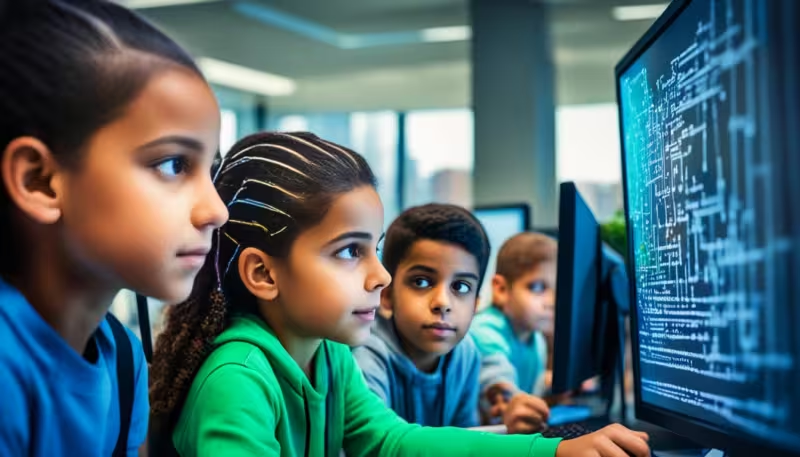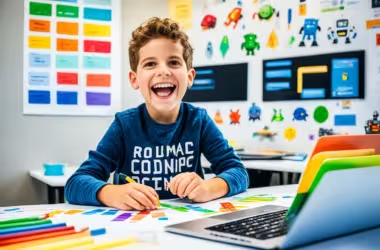What if your child’s potential is unlocked not through old subjects, but by coding? Today, learning to code is crucial in early education. It boosts not just tech skills but also key life abilities.
Coding does more than teach kids programming. It builds problem-solving skills, sparks creativity, and improves logical thinking. Kids as young as five can start with platforms like Scratch. They can make games and stories, or try Python, which is great for starters. By using these tools, kids don’t just learn to code. They get ready for future jobs in areas like healthcare and media.
This article talks about coding for kids benefits. It covers how to start teaching them to program and the tools available. Our world is digital, teaching coding isn’t just a trend. It’s preparing them for their future.
Introduction to Coding in Early Education
Teaching coding in early education builds a strong base for young learners, preparing them for the future. Kids learn to create technology, not just use it. Coding makes learning fun and boosts digital literacy for kids, encouraging them to be inventive.
Coding skills early in childhood paired with practical activities enhance creative problem-solving. Sites like code.org provide interactive games that make coding easy to learn. Kids enjoy these activities and learn logical thinking and math, improving their skills.
Kids who code from a young age keep up with new tech easily. Studies show that these kids get a deep understanding of computer science. This early start might open doors in the tech world for them later.
Adding coding to lessons boosts kids’ tech skills and personal growth. Facing coding challenges teaches them persistence and resilience. It’s crucial to balance screen time with coding practice. This approach nurtures children’s overall development, benefiting from tech without its downsides.
At What Age Can Kids Start Learning to Code?
Finding the right age for kids to start coding is crucial for their education in coding. Children as young as 5 or 6 are ready to begin. This is because starting early comes with many early learning coding benefits. It sets the stage for their success in school. By using coding tools made for kids, they boost their thinking skills and creativity.
The Importance of Early Learning
Learning to code early helps kids solve problems better and makes their brains stronger. Research shows that kids who code do better in school. They should start coding when they’re about 6 to 7 years old. Coding teaches them how to break down big ideas into smaller parts.
Age-Appropriate Resources for Young Coders
There are many great coding resources for kids available. Tools like Scratch and Scratch Jr teach coding with visuals, which is fun and sparks creativity. Then there are platforms like Tynker and Code.org that offer hands-on tutorials. These keep kids interested. With these resources, kids learn the basics of programming easily.
Recommended Tools and Languages for Kids
When kids start coding, picking the right tools and languages helps a lot. Scratch and Python are great choices for them. Both are top picks for young minds to dive into coding.
Scratch: The Visual Programming Language
Scratch makes coding fun and interactive for kids. They can make games, animations, and stories easily. By using colorful blocks, kids learn to code in a visual way. This helps them understand complex ideas while having fun.
Research shows Scratch boosts memory and joy in young coders. It’s a captivating way to introduce them to coding.
Python: A Beginner-Friendly Language
Python is excellent for kids just starting out. It’s easy to read and very flexible. Python makes switching from visual to text coding smoother. “Python Turtle” is one tool that makes learning exciting. It prepares them for more complex coding lessons.
Python lays a strong groundwork in coding for kids. It stands out as a beginner-friendly language.
Recommended Books for Young Programmers
Getting kids into programming can be fun with the right books. These books are perfect for kids with different interests. They make learning to code easy and fun for your young coder.
Engaging Stories with Coding Concepts
Books that tell stories make coding easy to understand and fun. Hello Ruby by Linda Liukas uses stories to teach programming to kids. It keeps them interested and teaches valuable skills like problem-solving. Computer Decoder: Dorothy Vaughn, Computer Scientist tells an inspiring story. It gets kids excited about coding by showing them a pioneer in computing.
Step-by-Step Guides for Beginners
Kids’ coding books offer clear instructions to explain coding. Coding for Kids: Python has 232 pages of simple lessons for kids over nine. Coding Games in Scratch: A Step-By-Step Visual Guide to Building Your Own Computer Games is great for 7 to 10-year-olds. It simplifies coding and encourages kids to learn by doing projects. How To Code: A Step-By-Step Guide To Computer Coding is another good book. It’s made for 6 to 11-year-olds and makes coding engaging.
Building Strong Problem-Solvers
Coding teaches kids to break big challenges into smaller parts. They learn critical thinking through coding. This helps them tackle school tasks and everyday problems confidently.
While coding, children boost their analytical skills. They identify issues, think of solutions, and test their ideas. This teaches them to be resilient and see failure as part of learning.
Debugging code teaches them traditional problem-solving steps. This improves their problem-solving skills even more.
Kids also learn about teamwork through coding. They work together on projects, which improves their communication. This teamwork is just like what they’ll experience in future jobs.
Coding sparks creativity and innovation in kids. They work on games, stories, and animations. This helps their grades and strengthens their logical thinking.
Coding activities provide a safe space for learning. Kids learn to solve problems on their own. They become more focused on details, which is important for future tech leaders.
Fostering Creativity and Innovation
Learning to code lets kids tap into their creativity. When they code, they can experiment and create unique projects that combine art and technology. This method goes beyond regular learning, sparking innovation in areas from science to arts.
Creative activities like drawing can lower stress, helping kids feel better emotionally. Through creative play, they learn to think in new ways. These experiences boost their confidence and help them grow, mentally and emotionally.
To boost creativity, teaching kids to code is key. Coding lets kids try out their ideas and solve problems. They learn resilience, teamwork, and how to fix mistakes. These skills are crucial.
Through coding, children can bring their ideas to life, making games or animations. This achievement makes them proud and encourages them to keep creating. It teaches them to tackle problems creatively, blending logic with imagination.
Groups that support creative learning know how important it is for kids to learn by doing. By engaging in tasks like arts and crafts, kids learn to think deeply and creatively. Coding is a perfect fit for this, preparing them to face future tech challenges.
Enhancing Logical Thinking through Coding
Coding is a great tool for kids to boost their logical thinking. By coding, kids tackle problems step by step. This is key in programming and many school subjects. It shapes their way of thinking and solving challenges.
Precision and Attention to Detail
In coding, being exact is critical. Kids must pay close attention to every little detail. A small mistake can cause big problems. This need for precision teaches them to analyze things carefully. They learn this discipline in coding, but it helps them in other school subjects too. This boosts their overall performance in school.
Transferable Skills to Other Subjects
Coding skills help in more than one way. They connect ideas in different subjects. For example, the logical thinking from coding helps in math and science. Kids become better at solving complex problems. They use steps learned in coding to tackle challenges. These skills also help in working together and communicating well in all areas of life.
Coding for Kids Benefits: Preparing for the Digital Age
Coding benefits for digital literacy are huge in today’s world. It makes kids more confident with technology. They learn to navigate and adapt to the complex digital world they will grow into.
Learning to code teaches kids logical thinking, problem-solving, and creativity. It prepares them for a tech-driven world. Plus, it helps break down gender and socio-economic barriers, giving every child a chance to succeed.
- As children debug and troubleshoot their codes, they learn the importance of persistence and resilience.
- Early exposure to coding cultivates interest in STEM fields, which are progressively vital in today’s job market.
- Understanding coding principles enhances mathematical skills, deepening kids’ comprehension of logic and patterns.
Completing coding projects boosts kids’ confidence. It teaches them to pay attention to detail, which helps in school and life. Coding also encourages teamwork, which builds collaboration and interpersonal skills.
Coding makes kids curious about technology. The skills they learn from coding help in many areas. As they get better at coding, they’re preparing for a future where understanding digital tools is key.
Coding sets kids up for success in many areas. Focusing on coding benefits for digital literacy shapes their future in a big way. It helps them academically and professionally.
Coding as a Fun and Educational Activity
Coding is more than just a skill. It’s an exciting adventure that mixes fun coding for kids with learning. Kids get into educational coding activities that make learning fun. They use innovative tools that are like games, which make them want to explore coding more.
Coding sparks creativity and innovation in kids. It teaches them to think creatively and solve problems. They learn to try different solutions, which teaches them persistence. This way, they do more than learn. They enjoy coding and feel proud when they solve a problem.
Coding also makes learning math fun. It helps kids see math in a new way, which makes them better at it without even noticing. They start to love STEM subjects, preparing them for many opportunities in the future.
Moreover, coding teaches kids critical thinking and how to solve problems. They learn to analyze situations and find solutions. Working on coding projects, kids can show their ideas visually. This can be a big help during tough times.
When kids code in a fun way, they start to love technology. This helps them handle tough times better and builds skills for good mental health. Making coding fun keeps them interested in learning more. This means they’ll be ready for the digital world ahead.
Transitioning to Advanced Concepts
Kids grow in coding, moving to advanced concepts is key. It makes them keen and skilled in programming. This step helps their coding journey and gets them ready for tech’s challenges. Early introduction to tough ideas keeps young learners focused and prepared.
The Importance of Continuous Learning
Technology changes all the time, making non-stop learning crucial for kids. Starting coding early lays the groundwork for lifelong education. It lets them handle harder projects as they grow. This continuous learning deepens their basic coding knowledge and prepares them for future tech roles.
Encouraging Lifelong Skills
Coding teaches vital skills like solving problems, bouncing back, and thinking creatively. These are key for a broad education. As kids grow, such skills boost their thinking abilities. Promoting skill growth through coding gives kids the courage to be creators in technology.
Create a Supportive Learning Environment
A supportive coding environment is key for kids to learn coding. Parents and educators help a lot in this journey. When parents join in their kids’ learning, it helps children grow in many areas. Studies show 89% of parents think coding teaches important skills. With their parents’ help, kids feel encouraged, supported, and ready to take on new challenges.
Engaging Parents and Educators
To make coding fun for kids, a positive learning atmosphere is crucial. Parents can help by:
- Setting up a dedicated coding space with all the necessary resources.
- Encouraging kids to try different coding projects.
- Discussing and participating in coding activities with their children.
- Working with teachers to reinforce coding skills at home.
Teachers also have a big role in creating this supportive coding space. They encourage teamwork and creativity, making coding enjoyable. When families and schools work together, children do better in school. Almost 90% of parents notice their kids’ improvement.
Finding Community Resources
Community resources offer great chances for kids to learn coding with others. Places like local coding clubs, workshops, and events are perfect for meeting other young coders. Parents can look for these to help their kids learn more about programming. Some options are:
- Coding clubs where kids can work on projects together.
- Summer camps focused on coding for a deep dive into learning.
- Workshops and seminars by tech groups designed for kids.
- Online platforms such as Code.org and Scratch for engaging lessons.
These community coding resources boost teamwork and resilience, preparing kids for the future. Learning coding with others helps them develop tech skills and thinking abilities. This supports a creative and innovative coding atmosphere for all kids.
The Future of Coding in Education
The way we teach is changing because coding is becoming very important in school lessons. This change comes from the need for kids to understand technology and have good tech skills. Schools and websites that teach coding are working to help kids learn programming well.
Trends in Schools and Online Learning Platforms
Now, kids can learn to code online more easily than before. These online classes are fun and teach important tech skills. Groups like Girls Who Code are helping to make sure everyone has a chance to learn coding. This is important so everyone can have the same opportunities.
We’re also seeing that learning new skills all through life is becoming more important. This is because technology keeps changing. Studying coding also means learning about being fair and safe online, which teaches kids to be careful with technology.
The Rising Demand for Tech Skills
Knowing how to code is leading to more job chances in many fields. This shows how important tech skills have become. Studies show that kids who know how to code do better in school. This is because learning to code also boosts thinking and problem-solving abilities.
Parents want coding taught in schools because it prepares kids for the future. This push is making sure kids are ready for a world that relies heavily on technology.
Conclusion
Teaching coding to children offers more than technical skills. It sparks interest in technology and builds critical skills like problem-solving and creativity. Today, over 60 million young coders worldwide benefit from platforms like Tynker. Tynker provides over 70 award-winning courses with fun tutorials. This helps kids follow their passions and aim for a bright future.
Interesting facts show that 67% of new jobs in STEM are in computing. The average salary for software developers was $120,730 in May 2021. This points to the high-paying jobs available for early coders. Also, students tend to prefer computer science over subjects like math and history. This highlights the need to include coding in education early.
With the right tools and support, we can boost children’s interest in coding. Research shows coding improves thinking skills. This supports the push for coding in kids’ learning. Overall, learning to code equips children with varied skills. These skills prepare them for a world driven by technology.






